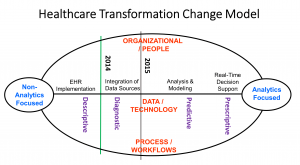The Growth of Predictive Analytics — 7 Thoughts and Observations
Here are seven things to know about how advanced analytics can be used to make predictions in healthcare.
Research and Training on Healthcare Analytics & Leadership
Here are seven things to know about how advanced analytics can be used to make predictions in healthcare.
Executive Summary
 Since 2014, the Healthcare Center of Excellence (HCOE) has been tracking the healthcare industry’s progress towards population health analytics using their proprietary Healthcare Transformation Change Model. This model was developed in 2013 to help healthcare organizations understand the requirements to become an analytics focused healthcare organization. The concepts were based on a customer relationship marketing (CRM) implementation model, previously co-developed by Professor Bennett. The CRM model was considered by Gartner to be one of the top three CRM implementation visions at the time and has become the basis for most successful CRM implementations today.
Since 2014, the Healthcare Center of Excellence (HCOE) has been tracking the healthcare industry’s progress towards population health analytics using their proprietary Healthcare Transformation Change Model. This model was developed in 2013 to help healthcare organizations understand the requirements to become an analytics focused healthcare organization. The concepts were based on a customer relationship marketing (CRM) implementation model, previously co-developed by Professor Bennett. The CRM model was considered by Gartner to be one of the top three CRM implementation visions at the time and has become the basis for most successful CRM implementations today.
There is only one day before the webinar on the 2016 State of Population Health Analytics study on Wednesday, December 7th. Spaces are filling up. Please register using one of the links below.
Since 2014, the Healthcare Center of Excellence (HCOE) has been tracking the healthcare industry’s progress towards population health analytics using their proprietary Healthcare Transformation Change Model. This model was developed in 2013 to help healthcare organizations understand the requirements to become a data-enabled healthcare organization. The concepts were based on a Gartner recognized CRM implementation model Professor Bennett previously co-developed. This model was considered one of the top three CRM implementation visions at the time and has become the basis for most successful CRM implementations today . Based on the model, the HCOE determined that in 2014, the industry was just past the “EHR Implementation” stage. In 2015, the dial moved a bit further as many organizations began achieving success with integrating data sources.
How is the healthcare industry progressing towards the implementation of population health analytics?
Since 2014, the Healthcare Center of Excellence (HCOE) has been tracking the healthcare industry’s progress towards population health analytics using their proprietary Healthcare Transformation Change Model. This model was developed in 2013 to help healthcare organizations understand the requirements to become a data-enabled healthcare organization. Each year, HCOE has published their “State of Population Health Analytics“.
The 2016 survey has been completed and Professor Bennett was interviewed by Becker’s Healthcare Review for the article “4 Tips for Hospitals Implementing Population Health Analytics“.
Category : Population Health Analytics
Hospitals are increasingly focused on leveraging predictive analytics to streamline their services — but how many organizations have successfully met this goal?
Executive Summary
When most people think about the challenges of implementing healthcare analytics, they wrongly expect it to be the data, talent or technology. Executives that have been successful implementing healthcare analytics know the top challenge is leadership. In a study performed recently, leadership was identified as the top challenge by participants. In fact, it wasn’t even close. Leadership was identified as a challenge by 29% of the respondents versus 18% for data and 14% for talent.
A couple of the most asked questions I receive from attendees at the conferences I speak at or attend is how to effectively start an analytics program and how do they take their current analytics program to the next level. These are tough questions for most healthcare organizations and areas I addressed in my book, Competing on Healthcare Analytics. The success of the book led me to believe that there was more that we could be doing to help healthcare organizations take the next step. After all, I helped Microsoft with their first global analytics function.
I attended Predictive Analytics World in Chicago the week of June 20 to June 23. I met a lot of new people and was reacquainted with several other colleagues. As I listened to 2 days of workshops and the pre- and post-conference workshops, some common themes emerged. Most of these themes confirmed what I have been touching on in the presentations I’ve made at conferences over the last few years and discussed in my book, Competing On Healthcare Analytics, but it was reassuring to hear the same concepts presented by others.
This could have a significant impact on moving the industry closer to becoming data enabled healthcare.